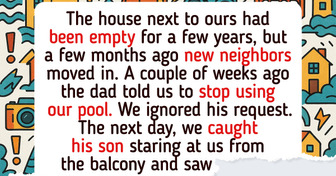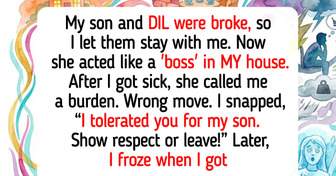10 Witty Responses to Rude Comments That Can Make an Impression


Whistles, unsolicited comments about a person’s figure or clothing, being teased in public — these exist on a daily basis. Research numbers revealed that 77 percent of women and 34 percent of men have experienced catcalling. And these incidents are so prevalent that the offended parties are forced to come up with their own strategies for dealing with these awful hecklers.
We at Bright Side look forward to the day when no one would need to use these tactics. But while it is still very much a reality in our world, here are some tips from experts and individuals that can help you out.
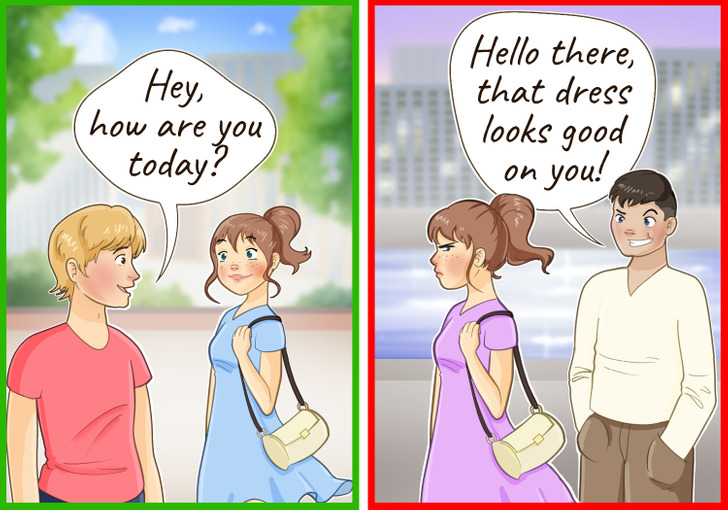
Some greetings may be considered plain human interaction, but if you feel offended, degraded, or threatened, then it’s clearly trouble. One woman gave an example, saying that when she’s out running, she doesn’t mind the people who notice her strength or her stride, because she’s an athlete, and it feels like a compliment for her hard work. But if the comment centers on the way her body moves, or it’s done with whistles and honks, it’s a different story.
Basically, your intuition will tell you if it’s a flattering remark or if it was aimed to embarrass you. And if it’s the latter, the next step is to acknowledge the situation. Like with any other tough circumstances, admitting that the problem exists will help you face it. The longer you avoid or deny the issue, the longer it will also take to be resolved.
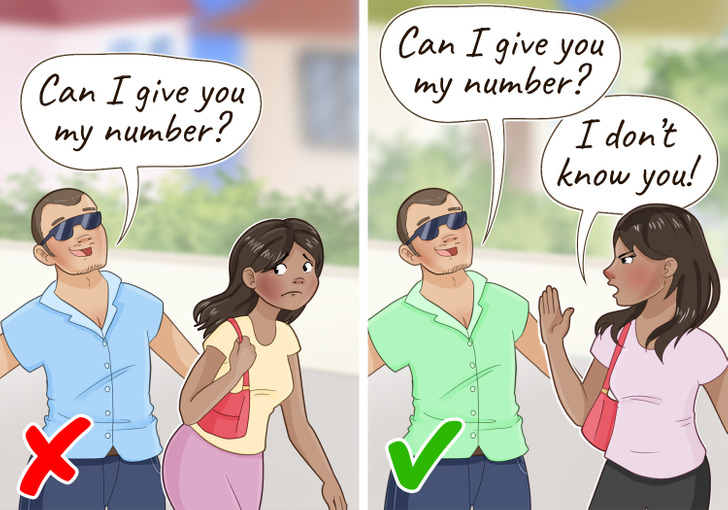
According to safety professionals, an effective strategy is to have a “go-to response” or a short statement that shuts down any possible conversation. Instead of simply ignoring the catcaller, you can say something like “I don’t need help,” or it can be as simple as “Stop!” then take yourself out of the situation by walking away.
Using “I” phrases with a firm tone and a neutral facial expression will also communicate your message better to the person bothering you.

If a rude stranger is trying to engage you, sometimes NOT responding at all sends out a stronger message. This non-reply also works well with a hostile look directed towards the other person — because there’s nothing that says “I don’t like this, I don’t want this” better than a piercing, death stare.

Some women face uncomfortable situations with politeness — maybe an awkward smile, or a weak response — and just hope that the troublemaker goes away. One website noted that those who suffered from criminals say that they felt something was wrong, but they didn’t do anything because they seemed like a nice person. And by ignoring their instincts, they weren’t able to remove themselves from harm’s way.
Keep in mind that you have the right to protect yourself from these predicaments. It’s fine to leave the area, transfer seats, or whatever you need to do to get away. You are not being rude — you are being smart by looking out for yourself.
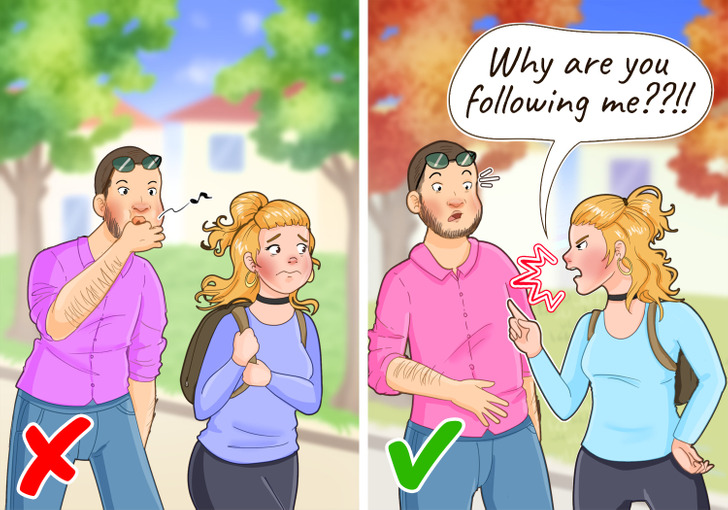
In one Reddit thread, women shared their various tactics for scaring away creepy men. And a couple of ladies revealed that fighting fire, with a bigger (and noisier) flame, was pretty effective in shutting the lads down.
One user said that she howled, “Why are you following me?! I don’t know you!” which caused everyone to stare, and reversed the situation by putting the catcaller in the uncomfortable position. One gutsy girl decided to tell a group of men to “Shut up!” and according to her, some of them even jumped back in fear.

A TikTok user has caught the attention of millions of netizens for her tips on how to give catcallers a taste of their own medicine. In one post, she narrated that when a random guy asks her to smile, she retorts by saying, “I’m afraid I don’t have anything to smile about.” And follows it up with weird statements — from “All my hair is falling out” to “I have impacted molars.”
This approach is echoed by other Reddit users, who also resorted to funny comebacks to stun the catcaller. Their schemes included wearing a cloak to appear intimidating, and giving the guy “the look” while chanting under one’s breath. If you’re in the mood to be creative, barking like a dog or making other animal noises apparently work too.

Texting or calling a friend, scrolling through the phone, or pretending to rummage through your bag can serve as a deterrent when someone suspicious attempts to initiate a conversation with you.
If the stranger refuses to take the hint that you are not up for an interaction, you may try the other points mentioned in this article. And if you feel like the situation may escalate, contact people you trust, so they can help you out.
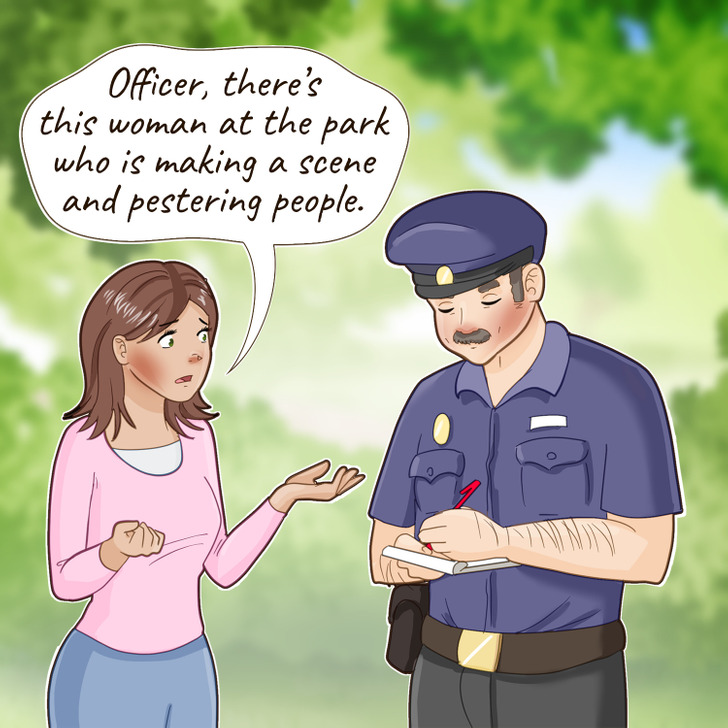
Catcalling can take a toll on a person’s mental and physical health. It can cause intense stress, anxiety or loss of confidence, and it is important to feel the support of loved ones. Thankfully, there are platforms for women to speak up and expose the violations that are happening around us.
One expert noted that women who shared their stories online had reduced trauma, and eventually felt more empowered to act against these types of transgressions. Do not be afraid of reporting the incident to authorities as well, be it the police, managers or HR department in case of a corporate setting.

Taking down notes in a diary or in a notebook can help you recall the details of the event in case you decide to file a formal complaint. And since this has extended into the online world and social media platforms, saving screenshots or photos as “receipts” of the cyber insult may come in handy when you submit your report to the authorities.

In case you witness someone receiving unsolicited attention, you can call the catcallers out by giving a disapproving glance, or saying “That’s not okay.” If you are not at ease with a possible confrontation, one way of helping is to interrupt them by talking to the person (like pretending to ask for directions.)
You can also go for the “fake friend” approach and start a conversation. Checking in on them by asking “Are you okay?” will also provide comfort and make them feel that they are not alone.
Have you experienced being catcalled? If so, what is your go-to response? Can you add other tips for dealing with catcalling?



